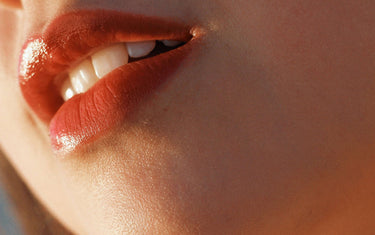3 min read / 25 April 2022 / Caitlin Devlin
Why you shouldn’t use cinnamon essential oil to plump lips
Here’s how this popular lip-plumping trick can actually be harmful.
Share this post

Many sites and blogs recommend using cinnamon to achieve fuller lips, but this ‘hack’ can be dangerous.
It’s true that cinnamon oil can have a noticeable effect on the fullness of lips.
Many people use it as a natural, needle-free way to achieve that lip-filler look, and you can find multiple recipes online that advise you to use cinnamon essential oil in lip-gloss recipes, or even to apply it directly to the lips.
Here’s why this isn’t always safe.
Does cinnamon oil plump lips?
Cinnamon oil can certainly have a plumping effect on lips. It can cause blood to rush to the surface of your lips, giving them the fuller appearance that many people are after. However, using cinnamon oil in this way is not as safe as some people claim.
Why can cinnamon oil be harmful for lips?
The reason why cinnamon oil makes our lips bigger is because it irritates them.
This irritation is what causes the rush of blood to our lips and makes them appear puffy, just like any other part of our body would swell if it came into contact with an irritant.
Our lips are especially sensitive, and so even a small amount of cinnamon oil can produce these effects.
Some people rely on sensations of tingling or even pain to let them know that the plumping effect is working.
However, these sensations are our bodies trying to tell us that the oil is actually burning our lips. If we ignore it, or take it as a good sign, we can be left with severe burning and blistering on the surface of our lips.
It is also not unusual for sensitive skin types to have even stronger, possibly allergic reactions to cinnamon oil which can make the unpleasant side effects even more severe.

Can I plump my lips with other essential oils?
In short, no, you probably shouldn’t try out other oils instead. Some blogs may recommend other potentially irritant oils such as cassia or cayenne.Is it safe to buy manufactured products for lips that contain cinnamon?
There are some makeup and beauty products out there that formulate plumping products for lips and know how to include cinnamon in the product in a way that won’t be harmful to us.
We’re certainly not saying that you shouldn’t use these products. Just make sure that you are always purchasing from a reputable brand, reading reviews, and considering your own skin sensitivity level.
What should I use cinnamon essential oil for?
Even if you aren’t applying it to your lips, cinnamon essential oil has lots of other benefits. It’s a highly antibacterial and antifungal oil that can be used in cleaning, and it is also said to have an energising effect on the body.
You can read more about the benefits of cinnamon essential oil here.

In summary:
- Cinnamon essential oil does plump lips, but it does so by irritating them.
- This can cause it to burn our lips and makes it unsafe to apply to such a sensitive area.
- Instead, look for cosmetic products from reputable brands that have a lip-plumping effect.
Shop our cinnamon essential oil here.










